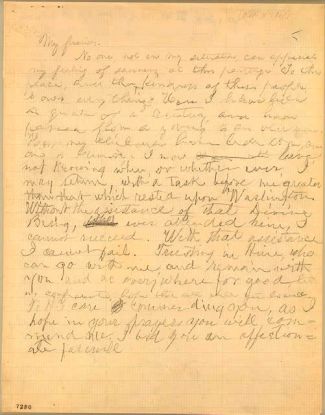 United States president-elect Abraham Lincoln leaves Springfield, Illinois, to start his inaugural journey to Washington, D.C. Prior to boarding the special presidential train that will carry him to the nation’s capitol, Lincoln addresses his friends and neighbors:
United States president-elect Abraham Lincoln leaves Springfield, Illinois, to start his inaugural journey to Washington, D.C. Prior to boarding the special presidential train that will carry him to the nation’s capitol, Lincoln addresses his friends and neighbors:
My friends, no one, not in my situation, can appreciate my feeling of sadness at this parting. To this place, and the kindness of these people, I owe everything. Here I have lived a quarter of a century, and have passed from a young to an old man. Here my children have been born, and one is buried. I now leave, not knowing when, or whether ever, I may return, with a task before me greater than that which rested upon Washington. Without the assistance of the Divine Being who ever attended him, I cannot succeed. With that assistance I cannot fail. Trusting in Him who can go with me, and remain with you, and be everywhere for good, let us confidently hope that all will yet be well. To His care commending you, as I hope in your prayers you will commend me, I bid you an affectionate farewell.
The religious language in Lincoln’s brief speech proves indicative of the religious imagery the president will periodically, and memorably, invoke during the Civil War years.
While never joining a church during his presidency, and only sometimes attending church services, Lincoln nonetheless was raised in a Baptist family. His parents, Thomas and Nancy Lincoln, were members of a (Primitive) Hard-shell Baptist church in the state of Kentucky, a Regular Baptist congregation with membership in the Licking-Locust Association of Regular Baptists. Upon moving to Indiana, the family joined a Baptist congregation there, Little Pigeon Creek Baptist Church. Abraham’s father, Thomas, became a leader within the Hard-Shell Indiana Baptist congregation.
Little of Lincoln’s specific Baptist upbringing seems to have remained in his adulthood. His theological reflections (this day and otherwise) are more deistic in tone than Baptist. Yet religious faith carries Lincoln – and through Lincoln, the nation – through the extraordinary difficult war years, sustaining president and nation until victory over slavery and the rebellious slaveholding states is achieved.
Source: Lincoln speech manuscript (link); the story of the 1921 re-discovery of the Lincoln’s membership in the Little Creek Pigeon Baptist Church (link)


